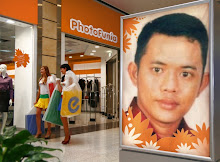
The students were called together in the main hall. "Today you will learn a simple yet profound lesson," the master said. "It is an easy one that even a small child can do. I want you to find a partner. Now, each pair must choose a blindfold. One of you will wear it, and the other one will lead him or her." One student in each pair then put on a blindfold.
"I have designed a course for you leaders to take your blindfolded partners through," the master continued. "Can you see the different markers that have just been placed around the room?" The leaders looked at the marked course.
"The game is very simple," the master said. 'Guided by your leader, you will feel whatever your leader guides you to. Don't worry-we have no harmful things for you to touch. Everything is safe. Well, there might be a scary thing or two!"
Some of the students shivered at the thought of what they might have to touch, but they agreed to be led around the hall. The blindfolded students touched whatever their leader asked them to touch. Occasionally a scream would break the silence when one of the students touched an object that was scary or unexpected. This made the lesson even more fun.
"Now, those of you who just went through the course blindfolded will go through again without the blindfold," the master said. "This time, feel the objects and look at them."
The students did as they were told, and at the end of the course they once again came to the bowl of water. Each student put a hand into the water, but no one jumped this time.
"How did you feel when you first touched the water with your blindfold on?" the master asked . The students said they were startled by the water and jumped when they touched it.
"Was the water so cold or hot that it made you jump?" the master asked.
"No," a student said. "It was just a surprise. We didn't know it was water."
"And the second time around-without the blindfold-did you jump when you touched the water?" the master asked.
"No," the student said.
"Why not?" the master asked.
"Because I recognized that it was only water," the student said. "I saw it before I felt it, so it didn't surprise me. The first time I couldn't see it, so I didn't know what it was. The second time I couldn't see it, so I didn't know what it was. The second time I could see what it was, and I knew what to expect."
"What can you learn from this lesson that is very simple yet great importance, not only to your life but to world peace?" the teacher asked.
The students were puzzled. What connection could there be between touching water and world peace?
"I don't understand what you mean," the student said. "The only difference between the two instances is that the first time we had no knowledge of the water and did not expect it, so we were surprised. It was like touching something for the first time, like when I was very young and played at the edge of the ocean. It was a new experience. The second time we all knew that the bowl contained water. Therefore, we were not surprised."
"So, you had no knowledge or expectation at first, and therefore you experienced water as if it were new to you," the master said. "That was a very different feeling from the second time when you knew it was water and the experience was just ordinary. Can you see the different state of mind in these two experiences?"
The master continued: "Now think about this lesson and hot it applies to you daily life. How often are things new or extraordinary to you, like when you were a small child. And how much do we 'know' about life-in a way that makes things, people and places old, familiar, rather dead? Can you see the importance of approaching life freshly, without the burden of knowledge from the past?
"Now, let's take a very big leap and apply the experience you've just had to thinking about yourselves in a relationship," the master said. "If your mind hangs onto old memories, especially ones of hurt and fear, and carries those experiences over into new relationships, what happens? Your mind is not fresh or new. It is burdened with past memories and is disturbed. This carrying over a problem from the past creates problems now. If your mind is not peaceful, then the world is not peaceful, for your thoughts create your actions and your actions create the world. If the mind is old, dead, caught in the past, what does the real miracle of ordinary life become? Can we experience life like a small child and really feel the joy of looking afresh at each moment? This, dear students, is at the heart of the martial arts. To have a mind that is not filled with past hopes, fears, hurts, prejudices and hates is to have a mind that is free, peaceful and truly loving. Think deeply about this, for it is the greatest lesson!
"Our activity today was a simple example of how the min, by living in the past, takes the newness out of life. See how the mind does this in other ways, how it stores memories that become 'you' and 'me,';'us' and 'them'-each with our beliefs about life based on those memories. See how this creates conflict by separating us from the other.
"Observe you mind and watch how this occurs, how the brain stores these memories, especially of being hurt emotionally. From past recollections, 'I know that I have been hurt and know I have to protect myself.' And collectively, 'We have been hurt and know we must protect ourselves.' See the danger of this, how it creates war within and without! Oh, students, this may be difficult for you to comprehend, but it is very important. You are not expected to understand all of this now. What you are being asked to do is begin to observe your mind, the mind that is the mind of all people, and to see how certain memories cause conflict in a relationship.
"Just begin with simple observations, as with the bowl of water, and move from there. You will, in so doing, discover the root of human violence and conflict, for it is within ourselves. We create the world; we are the world. When our minds are filled with fear, hurt, anger and hate, we create that in the world. If we can 'empty' the mind of all this unnecessary knowledge, we will really be living the art of 'empty self.' Think deeply about this, for it is the greatest lesson!"
The students and the master bowed at the end of their class.
Source: Terence Webster-http://www.martialinfo.com/article Satu ucapan yang sama namun berbeda penulisan. Itulah Osu dan Osh.
Satu ucapan yang sama namun berbeda penulisan. Itulah Osu dan Osh.















































